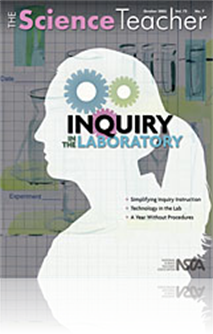All The Science Teacher resources
Journal Article
The authors of "How Far are the Stars," featured in the February issue of The Science Teacher, showed how the measurement of parallax permits scientists to infer astronomic distances. Give your students the chance to make similar inferences through a...
Journal Article
Simplifying Inquiry Instruction
Inquiry instruction is a hallmark of the current science education reform efforts. However, defining inquiry and assessing how much inquiry is supported by a particular activity or lab can be difficult and confusing. This article presents a simplifie...
Journal Article
Laboratory Instruction in the Service of Science Teaching and Learning
The Benchmarks for Science Literacy and the National Science Education Standards strongly suggest that students should be engaged in hands-on learning. However, too frequently the school laboratory is far removed from the recommendations of construct...
Journal Article
Technology in the Lab: Part Two
Probeware is increasingly being implemented in science classrooms because it is less expensive than it used to be and improvements in hardware and software have made it more accessible to students and teachers. This article focuses on probeware activ...
Journal Article
Geoscientists Explore the Earth
Visit the American Geological Institute (AGI) Earth Science Week website to learn about how you can provide your students with inquiry-based learning experiences that celebrates the theme, "Geoscientists Explore the Earth." On the website you will fi...
Journal Article
A teacher’s most effective strategy for creating a safe lab environment is to train students to follow recommended safety procedures. Students who understand the reasons for the safety rules and the dangers of breaking the rules can assume responsi...
Journal Article
Science instructors sometimes avoid inquiry-based activities due to limited classroom time. Inquiry takes time, as students choose problems, design experiments, obtain materials, conduct investigations, gather data, communicate results, and discuss t...
Journal Article
Satellite Remote Sensing of Coral Reefs
Coral reefs are one of the most endangered ecosystems as coral reef coverage has declined dramatically in the past three decades. In recent years, satellite remote sensing has become a popular and effective mapping tool for ecological studies, especi...
Journal Article
Idea Bank - Education and Research: Testing Hypotheses (EARTH)
The Monterey Bay Aquarium Research Institute (MBARI) and the Monterey Bay Aquarium (MBA) have created an educational outreach program titled "Education and Research: Testing Hypotheses (EARTH)," which will serve as a portal to a wealth of ocean obser...
Journal Article
Editor's Corner: Science Safety
With increasing emphasis on hands-on inquiry activities, teachers need to be as knowledgeable as possible about safety. Unfortunately, accidents in science classrooms are no exception! As a result, the theme of this issue of The Science Teacher (TST)...
Journal Article
A Message from the NSTA President: Developing a World View for Science Education
In this section, NSTA President Michael Padilla shares a story reflecting the affect that immigration has had on almost all school systems across the country. He shares his motivation for choosing Developing a World View for Science Education as the...
Journal Article
National School Science Safety Indexing Project: A Beginning
There is extensive agreement within the science profession that the "hands-on, minds-on" approach to teaching and learning described within the National Science Education Standards creates a more effective learning environment. However, inquiry poses...
Journal Article
The trend toward inquiry-based learning is providing today's students with a more enriching education. When implementing inquiry it is important to recognize the great number of safety concerns that accompany this paradigm shift. Fortunately, with so...
Journal Article
Career of the Month: Foodborne Disease Epidemiologist
Did you know that Salmonella and E. coli are just two of more than 250 different identified foodborne diseases? To Jack Guzewich, a Foodborne Disease Epidemiologist with the Food and Drug Administration's (FDA) Center for Food Safety and Applied Nu...



